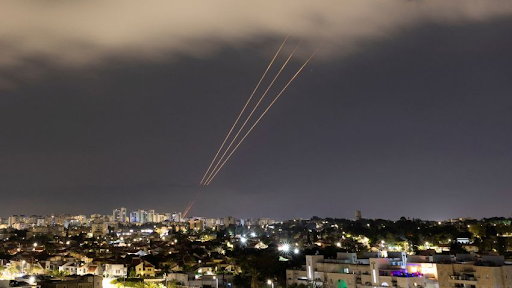
On April 14th, Iran launched over 300 missiles and drones at Israel, adding even more fuel to the storm of tensions rapidly taking over the Middle East. As Iran comes closer to gaining full nuclear capabilities and Israel continues fighting a growing war against Hamas, the attack and Israel’s retaliation pose the question of how much the Middle East can take before it explodes.
Iran’s attack on Israel came shortly after Israel attacked Iran’s Syrian embassy on April 1st, 2024. Seven Iranian military advisers were killed, a military commander. Israel had never committed such an attack before, but since October 7th, it has increased attacks on Iran along with attacks against the Iran-backed militia, Hamas. [1, 2]
Iran said it had the right to respond, claiming the attack violated international law. On April 14th, in an attack that lasted about five hours, Iran launched over 300 missiles and drones at cities across Israel, including Tel Aviv, the capital. Most of the projectiles were shot down with the help of the United States, United Kingdom, and France. However, there were still some hits, with one reported injury [2].
Israeli Prime Minister Benjamin Netanyahu and his war cabinet wanted to retaliate, but were initially divided over when and how retaliation should occur. Cabinet Minister Benny Grantz explained that they would “build a regional coalition and exact the price from Iran in the fashion and timing that is right for us” [3].
Conversely, due to fears of a serious escalation, Biden and other global leaders warned Netanyahu that the US would not play a part in any sort of retaliation against Iran. He cited Iran’s warning that if Israel retaliated, it would respond even more harshly [3]. This is not something to be taken lightly — the only reason Israel was able to combat Iran’s drone attack was due to its relationship with the United States. Additionally, American spy satellites monitored all Iranian launches, allowing Israel to tell its citizens to take shelter [4].
Despite the US’s warning, on Friday, April 18th, Israel launched a strike against Iran, officially erasing the taboo against direct strikes on each other’s territory [5]. Their attacks were launched at the city of Isfahan, which contains military research and development facilities and bases, and neighbors Natanz, which holds one of Iran’s nuclear enrichment sites [6]. Although the attack was limited in scale, it illustrated Israel’s ability to break past Isafahan’s air defenses, which could then give them access to sites such as the Isfahan uranium conversion facility, Iran’s primary site for converting uranium into gas that could be used to create nuclear weapons [5].
Reactions in Israel and Iran were muted, in a potential effort to de-escalate tensions [7]. Iran said it has no plans for retaliation and even asserted that “the foreign source of the incident has not been confirmed”. [8]
This strongly contrasted with previous Iranian sentiments. In addition to building up their nuclear capabilities over the past year, hours before Israel attacked Iran, Iranian military officials explained that they “could reverse [Iran’s] restraint on building a bomb if Israel struck its nuclear facilities”[9]. However, perhaps the countries could finally prioritize temporary peace over retaliatory attacks.
Unfortunately, the conflict is not over. As long as Iran continues supporting its proxies, specifically Hamas, Hezbollah, and the Houthis, all of which have been escalating attacks on Israel for the last six months. Israel has also long been worried about a potentially nuclear-armed Iran and what that would mean for its share of power in the Middle East [10].
Moreover, the two have been enemies since the Iranian revolution in 1979, when Iran’s new leaders adopted a strong anti-Israel stance. Since then, Iran has supported groups that regularly attack Israel, and Israel pledged to attack Iran’s nuclear program if it reached weapons capability. On top of that, Israel has fought the Iran-backed Hezbollah, including in a war in 2006 in Lebanon. To counter Iran’s presence in Syria (which is predicated on both support for the president and the use of the country to funnel weaponry to Hezbollah), Israel has carried out hundreds of strikes against arms shipments linked to Iran and its allies. If that isn’t enough, the two have also been attacking each other’s commercial vessels at sea since 2019 [11].
Ultimately, as tensions continue to rise, conflicts, diplomacy, and alliances will all be part of a larger global game of chess. One question remains: Will there be a winner?
[4] https://time.com/6967124/u-s-defended-israel-retaliation-iran/
[5] https://www.nytimes.com/2024/04/19/us/politics/israel-iran-analysis.html
[7] https://www.nytimes.com/live/2024/04/18/world/israel-iran-gaza-war-news
[10] https://www.rand.org/pubs/commentary/2024/04/the-iran-israel-war-is-just-getting-started.html
